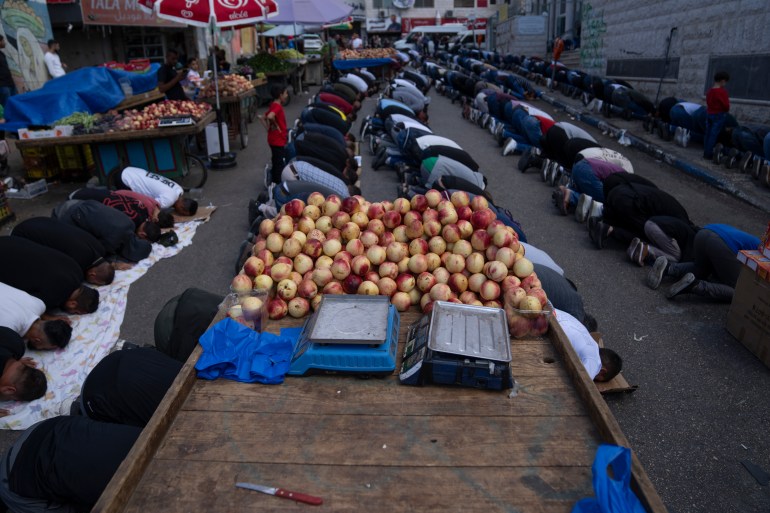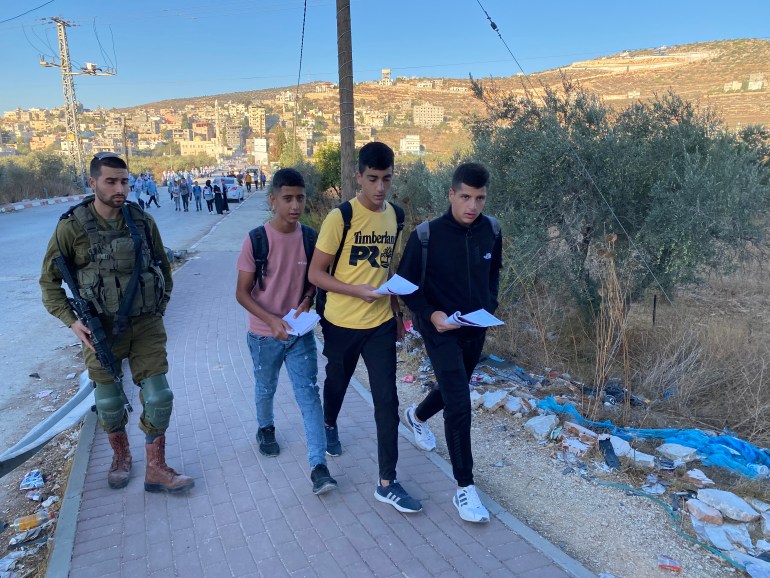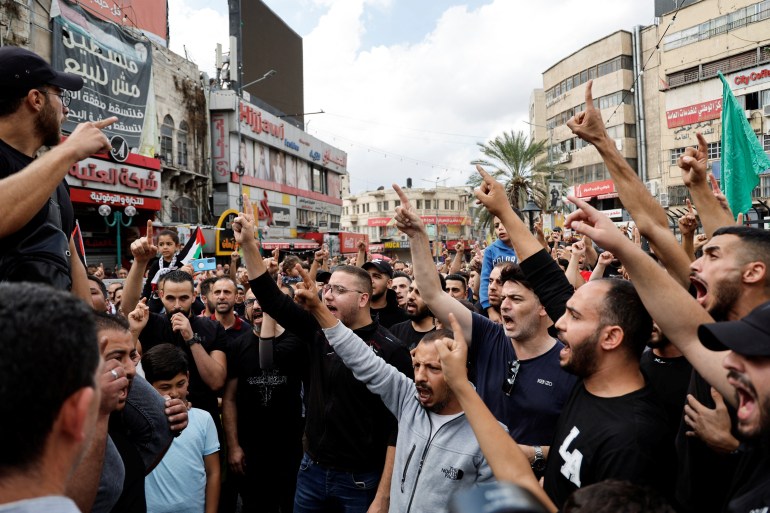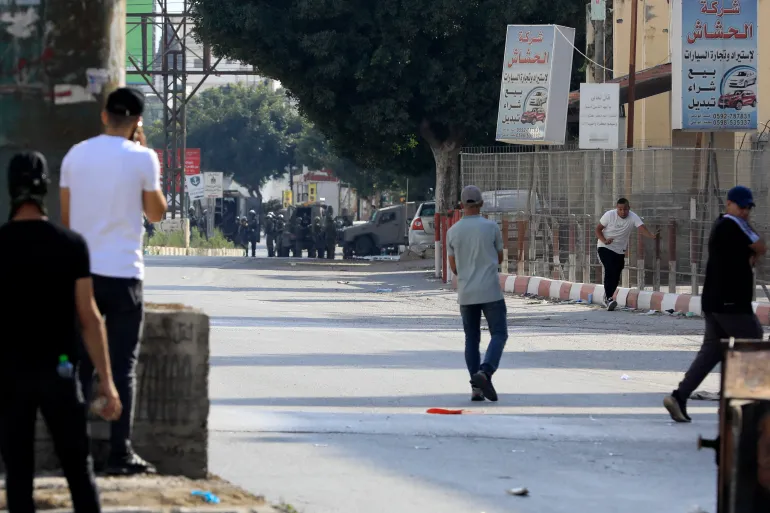Palestinians in occupied West Bank face closures, harassment and attacks
Since the Israeli offensive began on the Gaza Strip on October 7, the violence against Palestinians in the occupied West Bank has also escalated.
At least 105 Palestinians have been killed, and another 1,550 arrested in a crackdown by Israeli forces. Palestinian cities and villages have been cut off from one another through the Israeli closures and the threat of settler attacks, resulting in a near-complete commercial standstill and severe restrictions on movement.
Entrances to most Palestinian villages, towns and cities have been blocked by military checkpoints, earth mounds, cement blocks and iron gates, preventing movement between them.
Al Jazeera spoke to several Palestinians about the impact of these restrictions on their life.
Karim Gibran, B’Tselem director of the field research department in the occupied Palestinian territories
The restrictions imposed by Israel has increased the suffering of Palestinian communities and led to the isolation of families in their homes and lands, especially in areas located in Area C, which is under Israeli civil and security control. (Area C constitutes the bulk of West Bank territory)
Preventing access to water and food needs, especially in the herding communities, is done by Israel with the aim of displacing the Palestinian communities in those areas.
During the current offensive, the rate of violence practised by settlers against Palestinians has escalated, preventing them from accessing their lands, attacking them while picking olives, expelling them from their fields, and attacking Palestinians moving on roads.
The arming of settlers in the West Bank has increased significantly. This phenomenon has terrified Palestinians, making their movement fraught with danger and fear. The settlers also launched widespread incitement campaigns on social media against the Palestinians, which were fraught with explicit threats to the Palestinians, threatening them with assault, vandalising property, and killing them.
Ahmed Abu Ayyash, 66, owner of a supermarket in Beit Ummar
Everything is closed in the area where I live and work. Beit Ummar is a town located north of the city of Hebron. It is near the al-Arroub camp, south of the city of Bethlehem. The town has only two entrances that are completely blocked now. Whoever wants to move from Beit Ummar to Hebron has to take long and difficult bypass roads. Instead of the 2km (1.2 miles) we needed to reach Hebron, we now need 30km (18.6 miles).
I own a store called Abu Ayyash Mini Market in an area we call the Beit Ummar Triangle, which connects Beit Ummar to the town of Halhul and the al-Arroub camp. My shop is opposite an Israeli army watchtower.
The store is now completely closed because there is no movement of vehicles on this street. The area which connects Halhul to Beit Ummar to al-Aroub camp is closed by gates and dirt mounds.
I only go to the supermarket about every four days and I can access it because it is close to my house. I just go to check on the goods and electricity. I have a large refrigerator which has goods worth approximately 10,000 thousand shekels ($2,450), all of which are dairy products such as labneh, mortadella, hummus, and canned food. Now, most of their dates have expired.
I also have a parking lot that can accommodate 30 cars. Each car used to pay $10 to park and use it, and now, from October 7 until today, I have not received any cars because the situation is very difficult.

Beit Ummar, occupied West Bank map [Al Jazeera]
Ahed Musa, 55, food vendor
For the past 10 years, I have been delivering vegetables and fruits by transporting farmers’ vegetables from Shufa to Nablus. I also bring vegetables to stores in Tulkarem from the Nablus market.
Today, work is only 1 percent of what it was before October 7 due to the closures. Most stores I delivered to have been closed, as they were dependent on Palestinians from the 194 territories as their primary customers. But now their movement has all but been curtailed. Due to the closure of the checkpoint, the Shufa-Tulkarem checkpoint is completely closed by an iron gate and they are not allowed to enter.
The closures have affected my work to a very large extent, as my movement from Tulkarem takes 60km across the Shufa checkpoint to Nablus. Sometimes we take longer and more difficult roads if there are checkpoints, which adds another 20km (12.4 miles) to the journey.
 Palestinians attend Friday noon prayers ahead of a demonstration in solidarity with the Gaza Strip, in the West Bank city of Ramallah, on October 20, 2023 [Nasser Nasser/AP Photo]
Palestinians attend Friday noon prayers ahead of a demonstration in solidarity with the Gaza Strip, in the West Bank city of Ramallah, on October 20, 2023 [Nasser Nasser/AP Photo]
Aisha Abdel Rahman, 59, head teacher of al-Luban Asharqiya Girls Secondary School
My school is one of the most dangerous schools in the West Bank. UNICEF provided us with a bus to transport the female students at the expense of the education ministry.
I have 226 students in the school, ages 10 to 18, grades from seventh to high school. I am responsible for all these lives. As the school director, I am the mother of 226 souls.
The school, which was built in 1946 – two years before the existence of Israel – is located on the main village street. The village is located in the middle of the West Bank, between the cities of Nablus and Ramallah. The school gate, the classrooms, and the yard are all a few meters away from the street, which thousands of settlers pass through every day.
The school and the students have been subjected to harassment and attacks by the settlers, and we had to transfer some of them to the Salfit and Nablus hospitals.
Since October 7, the school has closed its doors and the female students have moved to online learning, which is not without its challenges.
I believe that the current conditions will last a long time and therefore, the school will remain closed perhaps for another weeks or even months. This is the first time this long closure has occurred due to the security situation and the condition of the roads.
 Palestinian schoolkids are forced to walk along a highway used by settlers to get to their school in Luban Asharqiya, in Nablus, northern occupied West Bank [Al Jazeera]
Palestinian schoolkids are forced to walk along a highway used by settlers to get to their school in Luban Asharqiya, in Nablus, northern occupied West Bank [Al Jazeera]
Arif al-Hawari, 36, store owner
My brothers and I own a bakery and a supermarket (in Huwara). We live above the bakery which is on the main street. My brothers tried to open the back door to sell bread, cakes, and food to neighbours and people in need. The Israeli army came and opened fire and detained my brother for several hours.
All bakeries, pharmacies, and grocery stores in Huwara have been completely closed for 22 days. A large portion of the people who rented in Huwara have terminated their contracts and moved to work within cities such as Ramallah and Nablus.
Our sales were to all areas of the West Bank, in all its cities, villages and refugee camps.
All the roads are blocked in Huwara, and we lost 60 percent of our customers due to the tense circumstances and conditions.
 Palestinians take part in a protest in support of the people in Gaza, after hundreds of Palestinians were killed in a blast at al-Ahli Hospital in Gaza that Israeli and Palestinian officials blamed on each other, in Nablus in the Israeli-occupied West Bank October 18, 2023 [Raneen Sawafta/Reuters]
Palestinians take part in a protest in support of the people in Gaza, after hundreds of Palestinians were killed in a blast at al-Ahli Hospital in Gaza that Israeli and Palestinian officials blamed on each other, in Nablus in the Israeli-occupied West Bank October 18, 2023 [Raneen Sawafta/Reuters]
Jamal Odeh, 56, owner of a wedding and events hall
Since the beginning of the war on Gaza, we have been confined to our homes. Life is unbearable. The Israeli occupation carries out collective punishment on people and allows the settlers to kill us by shooting at our homes.
I, personally, have several shops and businesses on the main Huwara Street, all of which have been closed for three weeks. All aspects of social and economic life have stopped. Today, I am unable to open the door of my house or open a window.
The last wedding celebration was on October 6. People are unable to continue their lives normally. Even before the war on Gaza, we were subjected to daily harassment by the settlers and the army, to the point that they would hinder many events. All people’s events have been postponed and cancelled.
Get Involved
If you'd like to help with maintaining or developing the website, contact us.
Publish
Publish your stories and upcoming events on Indybay.



